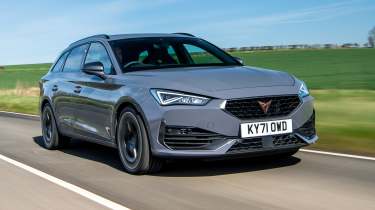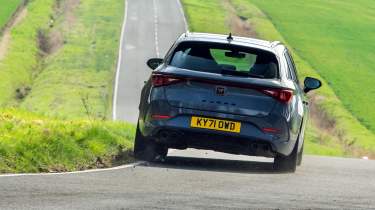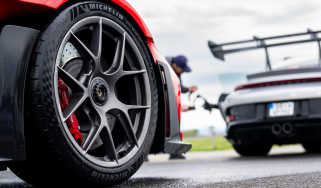Cupra Leon Estate 310 Fast Fleet test – six months in the 300bhp wagon
Capable but not compelling, our Cupra from the ICE age has departed the evo Fast Fleet
What can we say about evo’s departing Cupra Fast Fleeter? No, that’s not a rhetorical question – I mean it: what can we actually say that we haven’t already said? I knew the day was approaching when I would have to write this end-of-term report, and I can’t say I’ve been particularly looking forward to it. The Cupra Leon Estate has been a fast and fairly practical means of transport, but I’m afraid I just didn’t gel with it in the end, and I can’t say I miss it now it’s gone.
For me, the trouble with cars like the Leon is that it feels rather obvious the game has moved on – both for manufacturers and for driving enthusiasts. With the former, the obvious lack of real joy in the Leon gives a strong hint that the brand – as with the rest of the VW Group – has already turned its attention to EVs, and both financially and intellectually is simply going through the motions with its remaining ICE cars. We’d say much the same about the Golf Mk8, for example, although the Skoda Octavia manages to avoid much of this criticism. For drivers, meanwhile, the Leon lacks the sparkle that used to mark out fast SEATs as an interesting alternative. Sure, they were rarely class leaders, but there was always a place for them as a cheaper, often more feisty relation to other members of the parent group, let alone the market as a whole. Yet all of us struggled to really pinpoint what the Cupra brand and this car really stood for.
More reviews
> Cupra Leon Estate VZ3 2024 review – Cupra’s rival to the Mercedes-AMG CLA35 Shooting Brake
That isn’t to say the Leon Estate 310 is a bad car. It can cover ground at an astonishing rate, in all weathers, and this must be made clear. It offers all the usual infotainment trinkets buyers expect, and is never what you could call ugly to look at – although our car’s Graphene Grey paint looked dowdy in anything bar spotlessly clean condition and bright sunlight. In many ways our Leon did everything that was asked of it, and you might say, ‘Well, what’s the problem then?’ But often I felt I could have done the same journey with the same level of reward in a smaller-engined – and more practical – Octavia Estate, for example, and for a 306bhp fast estate at over £40,000 that shouldn’t be a thought that’s anywhere near the mind.
Dislikes? Standouts were the operating system, which it shares with all the VW Group cars of this generation and gets no more satisfying to use over time. The twin-clutch ’box could be irritating if left to its own devices, but the paddles were the usual tiny items. It also lacked refinement at times, with a surprising amount of road and wind noise, perhaps exacerbated by the open volume of an estate and the large, panoramic glass roof. Quite a few passengers commented on this, so it wasn’t just over-sensitive road-tester ears in play.
And so the final feeling is one of ambivalence. A decent car, but one lacking purpose and definition. Our new Born, meanwhile, is already garnering some praise, so it seems the world moves on, and in some cases the old ways should be left behind.
| Date acquired | February 2022 |
| Duration of test | 6 months |
| Total test mileage | 5901 |
| Overall mpg | 32.2 |
| Costs | £0 |
| Purchase price | £43,525 |
| Value today | c£27,000 |
This story was first featured in evo issue 303.





